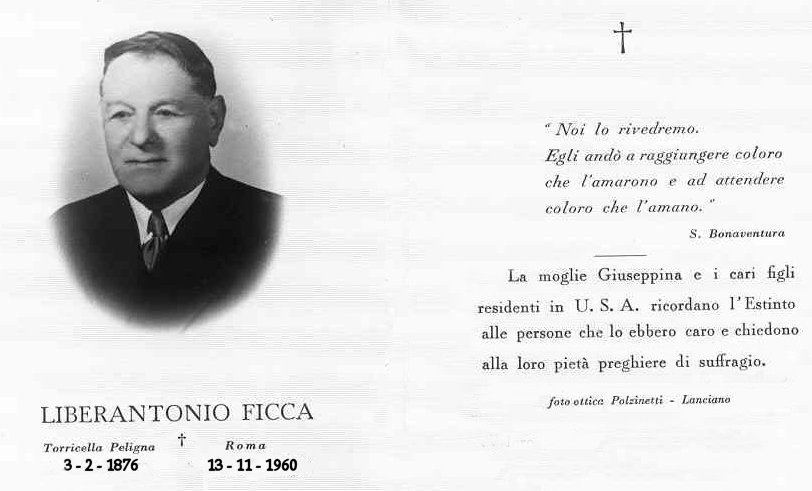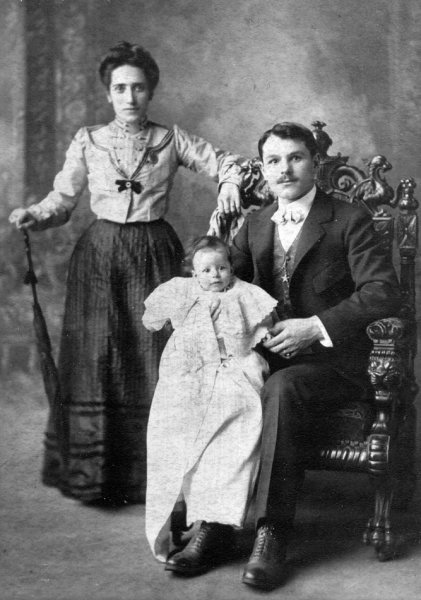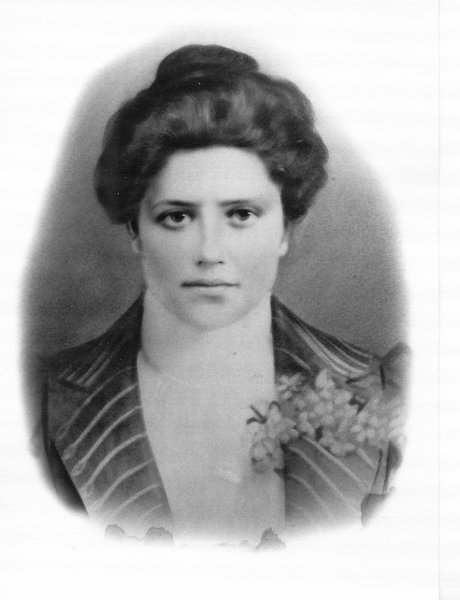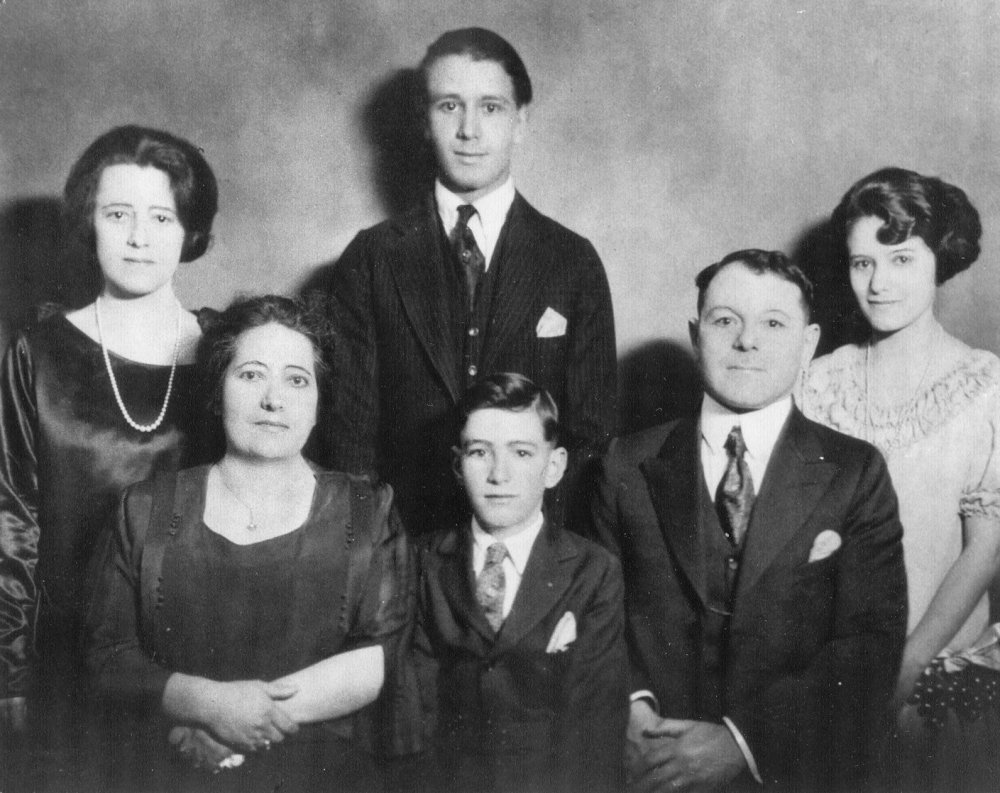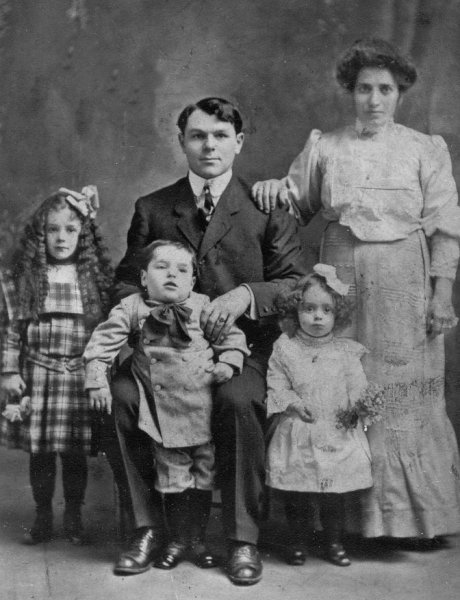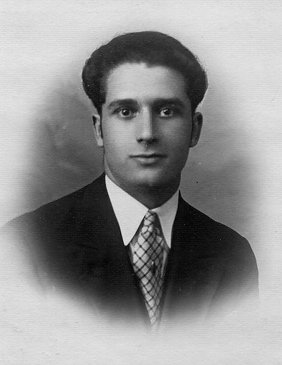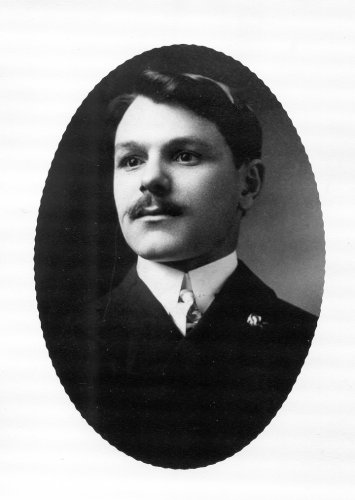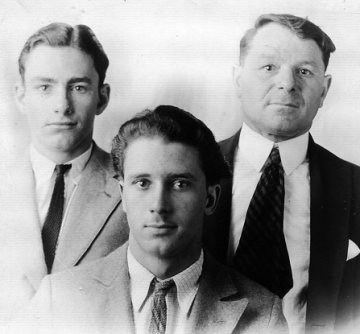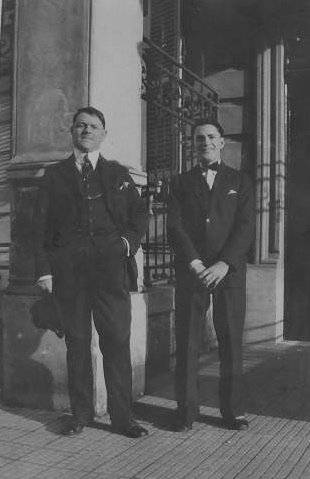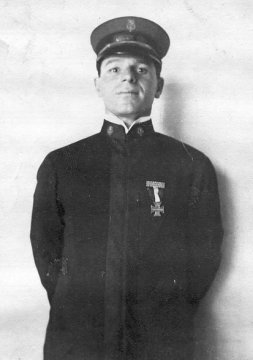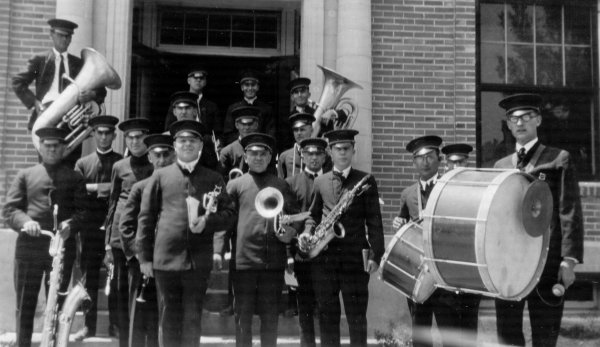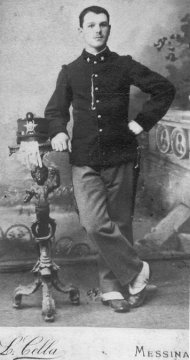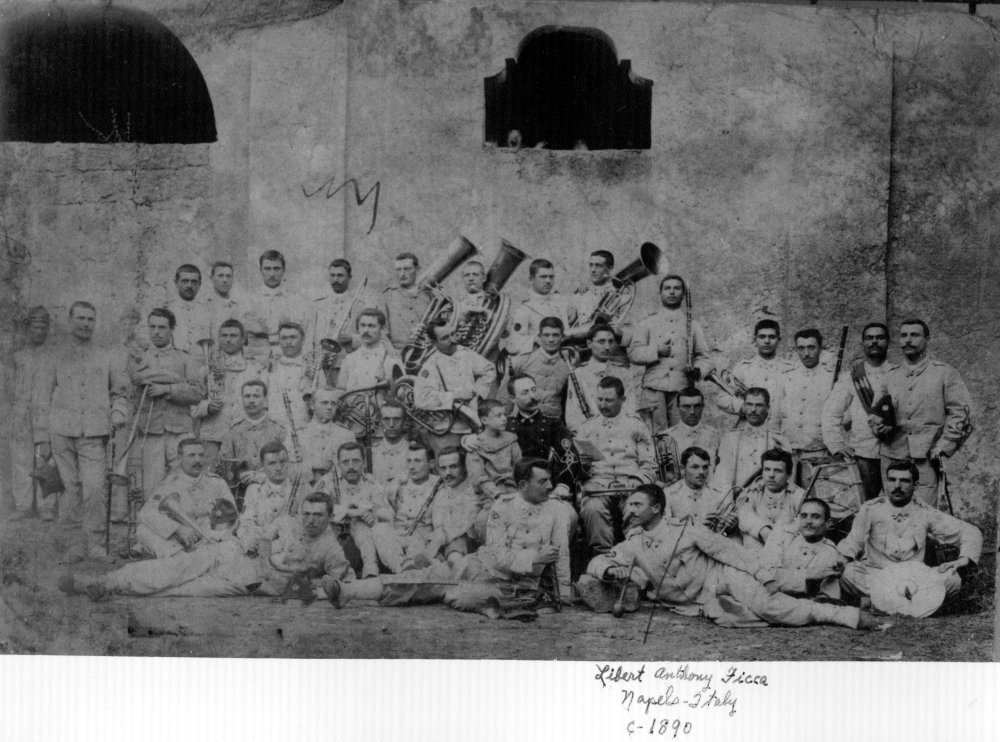Liberantonio Ficca
Estratti da una biografia
scritta dal figlio Frank Ficca (1909-2002), 6 ottobre 1995
Nato a
Torricella Peligna, Provincia di Chieti, il 3 febbraio 1876
Morto a
Roma il 13 novembre 1960
Sepolto
a Torricella nella
tomba di famiglia
Liberantonio arrivò in America all’età di dieci anni. Il fratello, Angelo, gli promise lavoro che consisteva nel portare acqua agli operai che stavano costruendo una ferrovia. Lui, non soddisfatto di quel lavoro, iniziò come apprendista presso una famiglia tedesca. Questo ebbe luogo probabilmente fra il 1886 e 1896.
Nel 1896, papà tornò in Italia per servire lo stato con tre anni di sevizio militare, che era obbligatorio per gli italiani. Fu mandato vicino Napoli, dove il suo amore per la musica lo spinse ad arruolarsi nella banda militare. Il capobanda, riconoscendo il talento di Liberantonio, lo iscrisse all’Accademia di Musica San Pietro Maiella di Napoli, dove studiò teoria di musica, composizioni e vari strumenti di banda. Inoltre compose musica per banda e scrisse una composizione per ogni strumento. (Io, Frank Ficca, ho avuto le composizioni di mio padre fino al 1995, poi le ho date a mia figlia, Jodie Bass, che risiede a Tucson in Arizona.)
Dopo il sevizio militare, mio padre continuò a frequentare l’Accademia di Musica per un’altro anno e prese il diploma di maestro di musica.
Papà
mi raccontò due esperienze mentre lui studiava all’Accademia. Quando gli
studenti avevano fame e non avevano soldi, componevano una canzone e la
vendevano. Uno studente, Pietro Mascagni, compose una canzone, “Mattinata”,
che ancora oggi riporta tanto successo. Il Mascagni diventò un famoso
compositore di opera.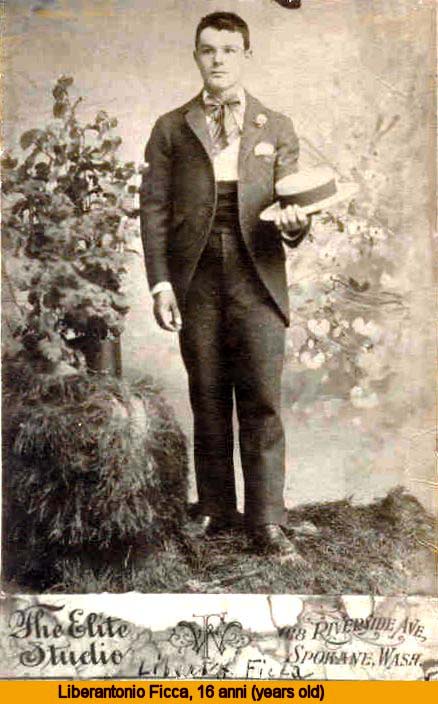
Un’altra esperienza riguarda Enrico Caruso. Papà sentì Caruso cantare al suo primo ruolo come opera "singer"; l’esecuzione fu scarsa e lui fu fischiato dagli spettatori.
Nel 1899, papà sposò Angelina Porreca di Torricella. L’anno seguente vennero negli Stati Uniti e presero la residenza a Denver, in Colorado, dopo un piccolo soggiorno a Golden. La prima residenza a Denver era alla 30ma. Strada, vicino al fiume Platte. Penso che Emma nacque lì. Zia Nellie (sorella di Angelina) e zio Tony Massano abitavano vicino a loro.
Papà fece successo con due professioni: maestro di banda e maestro di sartoria. Dal 1900 al 1909, lui diresse la sua banda al “Luna Amusement Park” in Denver Nord, sulla banchina del lago “Sloan”. Il park fu distrutto da un fuoco nel 1912.
Dal 1900 al 1919, aveva un gruppo di musicisti, suonavano agli sposalizi, ai funerali ed in altre occasioni speciali. Ricordo che durante la marcia di un funerale mio padre dirigeva la banda; credo che avevo otto o nove anni.
Durante il proibizionismo in America, la nostra famiglia si trasferì a Casper, Wyoming. Dal 1919 al 1927, mio padre fece un contratto con la città di Casper per condurre concerti settimanali durante l’estate nel parco comunale, ubicato dirimpetto al Comune di Casper. La banda suonava ogni venerdì su un palcoscenico nel centro del parco e la gente ascoltava la musica seduta sul prato. Io, Frank, suonavo la tromba alto nella banda di mio padre da quando avevo dieci anni fino a diciassette anni.
Nel 1923, mio padre fu premiato con un contratto dallo Stato di Wyoming, per dirigere la sua banda per una settimana, durante la fiera statale annuale a Douglas, nel Wyoming. Lui diresse la banda ogni pomeriggio ed accompagnava gli artisti. L’artista più importante fu la famosa soprano madame Schuman Heink.
Papà prosperò come maestro sarto dal 1900 al 1925. Il suo lavoro consisteva nel pulire, stirare ed aggiustare vestiti; ma la sua specialità era quella di fare vestiti nuovi. Un cliente dal nome Maxwell, il quale era interessato in affari di petrolio, ordinò tre vestiti che vennero a costare $450 ciascuno. Un’altra volta fece un vestito ad un cliente che distribuiva prodotti alimentari, per avere in cambio cibo per noi. Un’altro vestito lo fece in cambio di quattro gomme speciali per la nostra macchina (1921 Hupmobile).
A Camper papà fece un contratto con il proprietario di un albergo, l’ Henning Hotel, per lavorare esclusivamente per i clienti dell’albergo e il proprietario, a turno, gli faceva ricevere una commissione. Ricordo che la bottega aveva un tavolo lungo, circa quattro o cinque metri, una macchina speciale per cucire ed una stiratrice a vapore.
Nel 1925, lui smise il mestiere di sarto e fondò a Casper una scuola di musica, la “Ficca Music Studio”. In quel periodo si interessò di investire in moneta italiana. Lo stesso anno tornò in Italia per utilizzare la moneta italiana. La valuta della lira però andò giù, quando l’influenza della monarchia in Italia stava diminuendo (1924-1925). A Roma fece acquisti e comprò due appartamenti: uno a Via Giorgio Baglivi, n. 3 e l’altro a Via Treviso, n. 52.
Prima di tornare in America, papà visitò un negozio di musica a Torino, dove era esposto, per vendita, un violino fatto nel 1650 da Mathais Albani. Lo comprò per ragioni di investimento. Nel 1926 circa, un famoso violinista, John Kublik, diede un concerto a Casper; mio padre l’avvicinò e gli chiese se voleva comprare un violino Albani , Kublik rispose: “questo è il mio Stradivari e quest’altro il mio Guarnieri (due perfetti e molto valutati violini), non so cosa posso farci con un violino Albani”. Quella fu l’unica possibilità per vendere il violino.
Nel giugno del 1927, la nostra famiglia si divise. Lasciammo Casper per un breve soggiorno a Denver. Poi mamma, Emma e Maria andarono a Phoenix, in Arizona, per ragioni di salute di mamma; mentre papà, Bill ed io andammo a Roma.
Papà aveva intenzione che io studiassi il violino e la musica presso L’Accademia di Musica San Pietro Maiella di Napoli, dove lui aveva studiato dal 1894 al 1898. La scuola, però, era chiusa per l’estate. Rimanemmo a Napoli per circa una settimana, dove, con papà come guida, visitammo posti turistici prima di andare a Roma.
A Roma, soggiornammo in un albergo a Via Cavour per pochi giorni, prima di andare ad abitare in una pensione con la famiglia Rampini, al quinto piano della Torre del Conte, che era quel che rimaneva del Castello Del Conte distrutto dai terremoti e dalle guerre. Mio padre era stato lì nel 1925. La Torre era un posto molto antico sulla Via Cavour, vicino al Foro Romano; fu costruito nel 79 AD, lo stesso anno in cui fu costruito il famoso Colosseo. Con la famiglia Rampini, eravamo in affitto in una sola camera e mangiavamo con loro a colazione e pranzo.
Papà iscrisse me e Bill nelle scuole di musica. Bill studiò voce, clarinetto e sassofono; io, violino e musica. I miei studi si svolsero prima presso L’Istituto Nazionale di Musica e dopo presso la rinomata Accademia di Musica di Santa Cecilia, con il professore Umberto Sandri.
Nel giugno 1930, ritornai in America con papà. Bill tornò qualche tempo dopo. A New York papà comprò una “Hupmobile” del 1926, a sei cilindri, per andare a Phoenix in Arizona. Il viaggio fu, più o meno, normale. Ci fermammo a Denver per visitare dei parenti e poi continuammo per Phoenix. Durante il viaggio deviammo su una strada non tanta conosciuta, dove incontrammo ostacoli non previsti, ritardando il nostro viaggio. Ci impiegammo due giorni per raggiungere la nostra destinazione.
A Phoenix, io e mio padre abitavamo su “North Central”, proprio dirimpetto alla Scuola per gli Indiani dell’Arizona. Pure mia madre, Emma e Bill abitavano lì. Dal 1930 al 1933, papà lavorò come sarto in un negozio di vestiti. Durante il mese di marzo 1933, la città fu colpita da una forte gelata, che distrusse l’intero raccolto di agrumi, mandando la città in crisi. Il negozio dove papà lavorava fu chiuso e lui rimase senza lavoro.
Papà, io, mamma e Bill tornammo a Denver, al 2720 Bryant Street, in una delle due case che avevamo a Denver. Durante la depressione, ricevemmo aiuto dagli zii Tony e Nellie, i quali avevano un negozio di alimentari.
Verso la fine del 1936, papà lasciò Denver e tornò a Roma. Il programma era di vendere la sua proprietà a Roma, mentre abitava in uno degli appartamenti a Via Treviso, 52. Circa un anno dopo, papà scrisse che una famiglia dell’Argentina era interessata a comprare le case. Purtroppo, quello era il periodo in cui Mussolini dichiarò guerra all’Etiopia; quel fatto cambiò l’intera economia italiana e mio padre non realizzò la vendita. La sua carta di cittadinanza americana fu annullata e lui non riuscì a lasciare l’Italia.
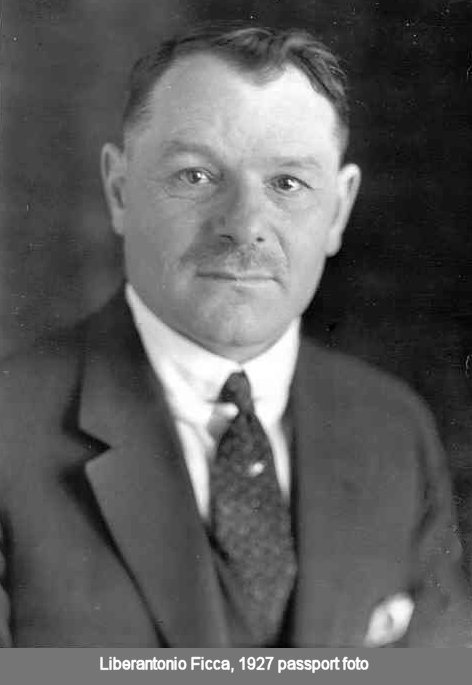 Nel 1941, Hitler controllava L’Italia. Tutti i documenti dove la proprietà era
registrata furono distrutti. Papà tornò a Torricella Peligna, dove lui era
nato. La nostra famiglia perse contatto con mio padre. Le ultime sue notizie
risalgono al 1941 circa.
Nel 1941, Hitler controllava L’Italia. Tutti i documenti dove la proprietà era
registrata furono distrutti. Papà tornò a Torricella Peligna, dove lui era
nato. La nostra famiglia perse contatto con mio padre. Le ultime sue notizie
risalgono al 1941 circa.
Mamma morì a Denver, e mio padre sposò Giuseppina De Stefanis a Torricella. Ricerche fatte dalla Croce Rossa nel febbraio del 1943 indicavano che papà e Giuseppina stavano bene.
Verso la fine del 1948, ricevemmo una lettera scritta da mio padre; (se la memoria mi assiste, la lettera fu scritta nel 1941). Questa lettera fu spedita a noi dalla sede dell’Ottava Armata Inglese di Londra. L’ottava Armata liberò la parte orientale dell’Italia, mentre quella occidentale fu liberata dagli americani e dagli alleati.
Nella lettera, mio padre ci comunicava che i tedeschi avevano occupato Torricella ed avevano distrutto le case usando le mine. Lui, però, aveva alloggio ed abbastanza da mangiare perché faceva l’interprete per i tedeschi.
Durante il 1945, papà e Giuseppina ritornarono a Torricella. Dopo parecchi anni, con l’aiuto di un avvocato ed il fratello di Giuseppina, riuscirono a riprendere possesso delle case a Roma, dove si trasferirono. Abitarono a Via Treviso, 52, fino alla morte di mio padre avvenuta il 13 novembre 1960.
Estratti da una biografia scritta dal figlio Frank Ficca, 6 ottobre 1995
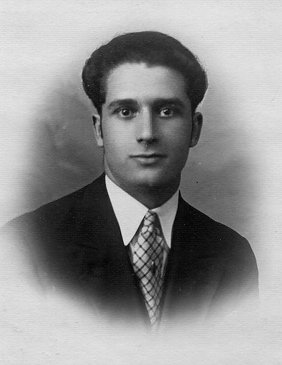
Frank Ficca (1909-2002)
Traduzione da Joseph Cionni
Liberantonio Ficca
Taken frmo a biography written by his son Frank L Ficca (1909-2002), October 6, 1995
b. February 6, 1876, Torricella, Province of
Chieti, Italy.
d. November 13, 1960, Rome Italy.
Buried in Torricella in the
family mausoleum.
Liberantonio Ficca came to the United States when he was ten years old. His older brother, Angelo, who was a section foreman for the railroad, promised him a job as a water boy for Angelo’s section gang. Dad told me that he did not like the job and he quit after a short time. They were in Spokane, Washington at the time. Angelo apprenticed him to a German family to become a master tailor. This was probably between 1886 and 1896.
In 1896, Dad went back to Italy to serve the
three years of military service required of all Italian men. He was stationed
near Naples. His love of music prompted him to join the military band. Dad
told me that the Band Master recognized Dad’s unusual talent for band music and
instruments, so instead of marching and drilling, the Band Master enrolled him
in the San Pietro Maiella Academy of Music in Naples. Dad studied music theory,
composition, and various band instruments at the Academy. While he attended the
Academy, he composed band music. One composition was written for each
instrument in the band. (I, Frank L. Ficca, have had Dad’s compositions until
1995, when I gave them to my daughter, Judie Bass, in Tucson, Arizona,) Dad
completed his military service and continued to study at the Academy of Music,
completing the Maestro License in another year.
required of all Italian men. He was stationed
near Naples. His love of music prompted him to join the military band. Dad
told me that the Band Master recognized Dad’s unusual talent for band music and
instruments, so instead of marching and drilling, the Band Master enrolled him
in the San Pietro Maiella Academy of Music in Naples. Dad studied music theory,
composition, and various band instruments at the Academy. While he attended the
Academy, he composed band music. One composition was written for each
instrument in the band. (I, Frank L. Ficca, have had Dad’s compositions until
1995, when I gave them to my daughter, Judie Bass, in Tucson, Arizona,) Dad
completed his military service and continued to study at the Academy of Music,
completing the Maestro License in another year.
Dad told me of two experiences he had while studying at the San Pietro Maiella Academy in Naples. When the students were hungry and out of money, one would compose a song and sell it. One of the students, Pietro Mascagni, wrote a song and sold it to help the students. The song, “Mattinata” became world famous, even to this today. Pietro Mascagni became a famous opera composer. Another experience Dad told me about concerned Enrico Caruso. Dad heard Caruso sing his first operatic role in Naples and his performance was not very good. He was booed.
In 1899 Dad married Angelina Porreca in Torricella, Peligna, their hometown. Dad and Mom came to the United States the next year and settled in Denver, Colorado, after living in Golden for a short time. Their first residence in Denver was on 30th Avenue, very near the Platte River. I think Emma was born there. Aunt Nellie (Angelina's sister) and Uncle Tony Massaro lived close by. It was here that Carmine Di Luzio came from Torricella Peligna, when he was a young boy and lived with Aunt Nellie and Uncle Tony. Mom and Dad helped also. Carmine stayed in the United States and worked as a painter. He sent all of his money home to support his family. When he retired he went back to Italy (Chieti) where his niece and her family took care of him until his death in 1969.
Dad prospered with two professions – bandmaster and master tailor. From 1900 to 1909 Dad conducted his own concert band at Luna Amusement Park on the west bank of Sloan’s Lake in North Denver. Luna Amusement Park burned to the ground about 1912 and was never rebuilt. From 1900 to 1919 Dad had a group of band musicians and played for weddings, funerals and special occasions. I remember marching with Dad and his special band playing for a funeral. I think I was about 8 or 9 years old. From 1919 to 1927, in Casper, Wyoming, Dad had a concert band contract with the city of Casper, to conduct weekly summer band concerts at the city park across the street from Casper City Hall. The band played every Friday evening during the summer in a large gazebo in the center of the park. The listening audience sat on the grass surrounding the gazebo. I, Frank, played the alto horn in Dad’s concert band from ten years of age through seventeen years of age.
During 1923, for a whole week in July, Dad was awarded the concert band contract by the State of Wyoming for the annual state fair at Douglas, Wyoming. Dad’s concert band played special band concerts every afternoon and accompanied the performers. The principle-performing artist for the state fair was the famous Metropolitan Opera soprano, Madame Schumann Heink. Dad’s concert band accompanied her operatic selections for her performances. I played the alto horn. In 1925, Dad retired from tailoring and conducted Ficca Music Studio in Casper, WY. He trained and instructed pupils in all instruments until June of 1927.
Dad prospered as a master tailor from 1900 to 1925. The main type of tailoring work was cleaning, pressing and altering. His specialty was handmade tailored suits. He had many samples of cloth, various patterns, colors, and weaves from which a person would choose. He ordered the proper quantity and proceeded to hand sew a suit according his special measurements taken of the customer. The person tried on the hand-sewn suit, adjustments were made and then Dad finished sewing the suit by machine. A perfect fit was assured.
Uncle Phil (Phillip Porreca, Mom’s brother) and Dad worked together in Denver, Colorado, with their own tailor shop until 1919, when Dad went to Casper, Wyoming. I think Uncle Phil learned his tailoring skills working with Dad. I remember two locations of Dad and Uncle Phil’s tailor shops in Denver. One was on Champa Street, just south of 17th Street on the east side of Champa Street – around 1917. I was seven years old and Dad bought some Denver Post newspapers for me to sell on the southeast corner of Champa and 117th Street. The tailor shop was my headquarters. The other location of Dad and Uncle Phil’s tailor shop was on 15th Street, the third shop from the corner of 15th Street and Tremont Street on the south side of 15th Street – probably before 1917.
The Ficca family was living at 69 W. Dakota Street, in South Denver. Aunt Nellie and Uncle Tony Massaro and Uncle Phil lived at 71 W, Dakota Street. Uncle Angelo and Aunt Louisa Ficca along with their children John and Ann lived at 67 W. Dakota Street. I, Frank Louis Ficca, and Ernest William Ficca were born at 69 W. Dakota Street – me, December 19, 1919, and E.W. Ficca, November 22, 1911. In 1918, while we were living at 69 W Dakota Street, Dad left Denver and went to Casper, Wyoming, to establish tailoring and musical occupations. Casper, Wyoming, was, then, a rich oil industry boomtown.
In Denver, at that time, Italian people were getting dangerously involved with mob control of prohibition. One home, on Federal Boulevard near 33rd Street, of an Italian family was completely destroyed by bombs. An Italian man was murdered in his home at 36th Street and Vallejo Street. I think Dad was very concerned and that decided his move to Casper, Wyoming. He started a tailor shop in a single room log cabin rented from the Trevett Drug Store family. The log cabin was behind the Trevett Drug Store on Central, between 1st and 2nd Streets. The log cabin had been the first Trevitt Drug Store when the patrons were mostly Indians.
Soon Dad had an agreement with the Henning Hotel on the corner of Center and 1st Street. It was the largest and best hotel in Casper. The agreement was that Dad would have all of the tailoring work of the occupants with a commission for the hotel owner, Mr. Henning. The Henning Hotel management arranged a space under the sidewalk on Center Street for Dad’s tailor shop. A stairway down from Central Street was the outside entrance to Dad’s tailor shop and the barbershop. Glass inserts in the sidewalk allowed some light in the shop. There was no ventilation.
I remember Dad’s shop. I worked there for him after the family moved to Casper in August of 1919. There was a long worktable – 12 to 15 feet long – at one end of the shop. A steam pressing machine and special sewing machine were in the center of the shop. The end opposite of the large worktable had a long clothing rack. Dad had a good beginning to his tailoring business when we, Mom, Emma, Mary, me, and Ernest moved to Casper, Wyoming. Besides the Henning hotel business Dad had many special patrons. He used his hand tailored suit specialty to very good advantage. He made a hand tailored suit for a wholesale grocer in trade for food. We had all kinds of food for a very long time. Dad made a hand tailored suit for four very special Pennsylvania vacuum Cup tires for our 1921 Hupmobile.
I remember one very special patron, Mr. Maxwell, in the oil well business. He had two hand tailored suits made for him in about 1923. I watched Dad and followed every phase of his making those two special hand tailored suits. I remember Mr. Maxwell picking out the fabric from the samples. When the material came, I watched Dad cut sections for each part of the suits. He hand sewed the sections together sitting cross-legged on the long table. I was operating the steam pressing machine doing the routine Henning Hotel patrons’ clothing needs. Mr. Maxwell came in and tried on the trousers first then the vests and coats. Dad made wax chalk marks to indicate changes. He then proceeded to machine sew and finish the parts of the suits. I was there when Mr. Maxwell came for the suits. He tried each one on, turning and looking in a full view mirror. He was very pleased and paid Dad $450 for each suit. This was during the height of Casper’s rich oil boom.
Dad, Mom, Mary, and Ernest took a one week vacation during the summer of 1923. Dad drove the 1921 Hupmobile touring sedan to Denver, where they visited with Aunt Nellie and Uncle Tony Massaro. Emma and I stayed in Casper. Emma worked at the Job she had and I worked and took care of Dad's tailor shop. Everything in the shop was routine – except for one article of clothing back from the cleaners - it was a ladies full pleated skirt that needed to be pressed. It couldn't be pressed on the steam pressing machine. With a hand full of pins, I proceeded to press and shape the skirt by hand. I think I surprised myself. The skirt came out beautiful! At the end of the week I deposited $400 in Dad's bank account. Emma and I took advantage and had dinner out every evening.
During this time that Dad worked in the tailor shop for the Henning Hotel, he invested in Lira (Italian money). As the Italian monarchy was failing (1924-1925) the value of the Italian Lira was failing. In 1925, Dad retired from his tailor shop. He went to Italy and spent all of his investments in the Italian Lira. He bought two condominium apartments, one at 3 Georgio Baglivi and the other around the corner, 52 Via Treviso, in Rome. Italy.
When returning to the U.S., Dad was in Torino,
Italy. While in Torino, Dad went to a music store to buy some sheet music to
bring home for Emma, Mary, Frank and Bill. On display and for sale was a 1650
Mathias Albani violin. Dad bought the Albani violin (1925) for speculation. We
were living in Casper, Wyoming then and there was little opportunity for anyone
to buy the Albani Violin. However, about 1926, the famous violin concert
artist, Jan Kublik, came to Casper to play a concert in the Rialto movie house.
Dad took me to hear the violin concert and took me back stage to meet Jan Kublik.
Dad told him that I played the violin and would he be interested in buying a
Mathias Albani violin. Jan Kublik showed us his two violins – saying; “This is
my Stradivari and this one is my Guarnieri.” (two of the most perfect and most
valuable violins.) “I don't know what I would do with an Albani violin.” This
was the only possible time that Dad might have sold the Albani violin.
In June of 1927, our family split up. We left Casper for a short visit in Denver, and then Mom and Emma and Mary went to Phoenix, Arizona, for Mom's health and Dad, Bill, and I went to Rome, Italy.
Dad had intended for me to study violin and music at the San Pietro Maiella Academy of Music in Naples, Italy, where he had studied in about 1894 to 1898, but the Academy was closed for the summer. We stayed in Naples for about a week sightseeing with Dad as our guide, before going to Rome where Dad had interests.
In Rome, Dad had us staying in a hotel on Via Cavour for a few days. Then he arranged for us to “pensione” with the Rampini family on the fifth level of the Torre Del Conte which was the remaining tower of the Castello Del Conte. Dad had stayed there in 1925.
The Torre Del Conte is quite an ancient landmark on Via Cavour near the Roman Forum. It was built in 79 AD, the same year as the famous Coliseum. The Torre or Tower is all that remains now. The Castello or Castle part was destroyed by earthquakes and warring sieges. With the Rampini family, we had a single room and had breakfast and dinner with them.
Dad enrolled me and Bill in music schools. Bill studied voice, clarinet, and saxophone. I studied violin and music; first in the Instituto Nazionale Di Musica with beginners because I didn't know how to read and write the Italian language. About a month later Dad arranged for me to apply to the famous St. Cecilia Academia Di Musica with Professor Umberto Sandri where I was accepted.
More about my studies of the violin in 'Frank L. Ficca'.
In June 1930, Dad and I returned to the United States. Bill had returned sometime earlier. While we were in New York City for several days, Dad bought a 1926 Hupmobile, six cylinder coupe to drive us to Phoenix, Arizona. Mom, Emma, and Bill were in Phoenix. Mary had married James A. Walsh in 1929, and they were living in Mesa, Arizona, near Phoenix
Our trip was quire routine – except for a broken valve spoke, keeping us overnight in Kansas. We stopped over in Denver for a few days with Uncle Tony and Aunt Nellie. Cousin Frank Porreca, from Erie, Pennsylvania, was living with them. Uncle Tony and Frank Porreca had recently returned to Denver from Phoenix, Arizona. They spent a year there for Uncle Tony to recuperate from double pneumonia Uncle Tony had been a stone mason and his lungs had been damaged from the stone dust. Uncle Tony and Frank Porreca gave Dad the map they had used going to and from Phoenix. The map was marked – Denver to Albuquerque to Gallup to Flagstaff to Prescott to Phoenix.
Dad and I left Denver for Phoenix in the Hupmobile coupe and followed the map to Albuquerque. As Dad looked at the marked route to Flagstaff and into Phoenix; he noted a shorter route - south of Albuquerque to Socorro, New Mexico, and straight west of Socorro into Arizona. So – we took the shorter route. From Socorro to Magdalena, the road was good. Then near the Arizona border the road became a single lane. Occasionally we had to stop to get rocks off of the road. At McNary, Arizona, we were out of gas. There were no gas stations. Dad went to the saw mill there and was able to get some gasoline. By nightfall we were in the Ft. Apache Indian Reservation. Dad rented a tepee for us to stay in. It was along the edge of a river – which we listened to all night long. In the morning we had to drive to Carrizo for breakfast – only one restaurant in town. From Carrizo to Globe the road was two lanes gravel, from Globe to Phoenix the road was two lanes paved. It took us two days from Albuquerque to Phoenix on the shorter route. Going through Flagstaff would have taken one day!
In Phoenix Dad and I lived on North Central – just across the street from the Arizona School for the Indians. This is where Mom, Emma, and Bill were living. From 1930 to 1933, Dad worked as a tailor in a Phoenix men’s clothing store. During March 1933, Phoenix experienced an unexpected freeze which froze the entire citrus crop overnight. This plunged Phoenix into a severe depression. The men's clothing store where Dad worked closed and Dad was out of work. Mom, Dad, Bill and I moved back to Denver to 2720 Bryant Street, one of two homes Mom and Dad owned in Denver. We lived off of Aunt Nellie and Uncle Tony's grocery store during most of the depression.
Late in 1936, Dad left Denver for Rome, Italy. He planned to sell his three properties in Rome. He lived in one of his condominium apartments at 52 Via Treviso in Rome. After a year or so Dad wrote that an Argentine family was interested in buying properties in Rome. However, about this time, Mussolini declared war with Ethiopia. That changed the whole Italian economy and Dad's prospect ended. He was not able to sell his properties. His American citizenship was canceled and he was unable to leave Italy.
In 1941, Hitler had control of Italy and destroyed city and county records. Dad moved to Torricella Peligna, his home town. The last time we had news of him was in 1941. We lost all track of Dad’s whereabouts for more that four years. Research done by the Red Cross revealed that Dad and Giuseppina were all right – February 1943. (Mom had died in Denver and Dad remarried Giuseppina De Stefanis in Torricella Peligna.) Late in 1948, we received a letter written by Dad in 1941. The four year old letter was forwarded to us from the British Eighth Army from London, England. The British Eighth Army liberated the eastern part of Italy. The US and allies liberated the western part of Italy.
To the best of my memory this was Dad's 1941 letter forwarded to us in 1945.
1941 Torricella Peligna Chieti
Dear Frank and Family,
The Germans have captured Torricella Peligna.
They have mined the houses. They forced all of the people into the Piazza
area. Fifty people were forced out and were shot down by machine guns. The
rest of us were forced to walk to a German prison camp at Chieti – about 30
miles away.
Don't worry about me. I work as an interpreter
for the Germans. I have food and shelter.
I hope that you are all well.
Love,
Father (Liberantonio Ficca)
Sometime in 1945, Dad and Giuseppina returned to Torricella Peligna. They could not return to Rome because they had no proof of ownership of the three properties. The Germans had destroyed all public and governmental records. It required several years before Dad and Giuseppina could restore their claim to the properties. Giuseppina wrote to me quite often explaining what they had to do to regain ownership of their properties in Rome. A lawyer and Giuseppina’s brother were involved.
Dad and Giuseppina lived at 52 Via Treviso until Dad's death on November 13, 1960. He is buried in Torricella Peligna.
Written by Liberantonio's son, Frank L Ficca, October 6, 1995

Frank Ficca (1909-2002)
